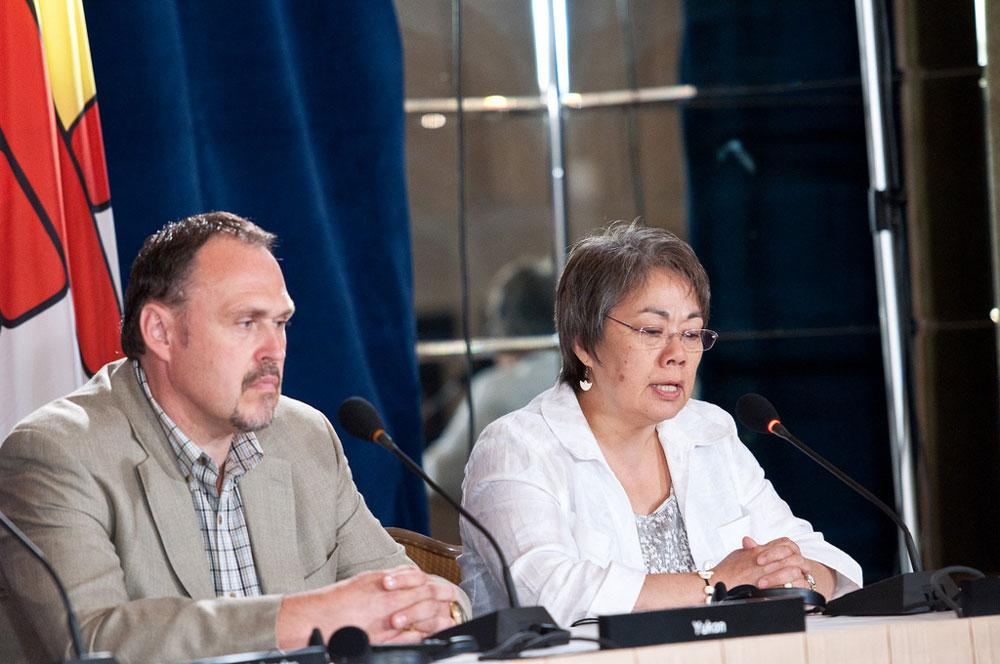Arshy Mann — CUP Western Bureau Chief
VANCOUVER (CUP) — Canada is the only arctic country without a university north of 60 degrees — but that may be changing.
Newly elected Yukon Premier Darrell Pasloski has said that his government is committed to building a university in the territory.
“By taking a leading role, we will work towards developing Yukon College into a northern university,” Pasloski stated in a press release during the September territorial elections. “We will work to explore university models, identify which model is best suited for Yukoners and northerners alike, and commit to achieving that goal.”
The idea of a university in the Yukon has been proposed every few years since the 1970s, with previous NDP and Liberal administrations getting behind the idea.
However, Yukon College remains the only centre for advanced education in the territory, providing both academic courses and vocational training.
During his election campaign, Pasloski said that his Yukon Party government would take initial steps toward a university that would include building a new student residence at Yukon College and also identifying land that could be used for additional academic facilities.
However, there remain questions over whether the Yukon would push forward by itself to build Canada’s first northern university or work with the other two territories.
According to Brent Slobodin, assistant deputy minister of education, before the recent election, the Yukon had been in discussions with the Northwest Territories, Nunavut and the presidents of all three arctic colleges about the possibility of a pan-northern university.
“During the campaign, our premier … indicated that the government party was very supportive of evolving Yukon College into a university,” he said. “And so we’re still very supportive of working with the other two territories, but obviously we have support from this government to evolve locally, as well, our own post-secondary institution.”
In their discussions with the other territories, Slobodin said that “there [was] no talk [of] bricks-and-mortars, so it’s a question of using the current bricks-and-mortars that we do have — looking at virtual technology and seeing where we can go from there.”
Amanda Graham, an instructor at Yukon College, said that she believes that merging the three territorial colleges — Yukon College, Nunavut Arctic College and Aurora College — is the most realistic way to bring about a university in northern Canada.
“We already have the beginnings of a university of a three-campus system — not much different from the University of Alaska, for that matter.”
The biggest barrier towards a northern university, whether exclusively in the Yukon or across the territories, remains cost.
“There is always the issue of what’s the cost of delivering in more of a remote institution than there would be down south,” said Slobodin.
Pasloski has stated in the past that he would expect both the federal government and mining corporations to help with funding.
Slobodin went on to say that another possible barrier would be recruitment of both students and faculty, especially when so many people are eager to move to places like Saskatchewan and Alberta.
Another challenge to overcome is population — fewer people live in the Yukon than attend Simon Fraser University.
Others have pointed to a failing K-12 education system in the territory that may not be able to provide high school graduates that are ready for a university education. The Yukon has a lower high school graduation rate than any of the provinces.
Graham said that one of the biggest challenges for creating a university would be demonstrating to Canadians that you can receive a good education in the territories.
“It’s not going to be easy to convince people that you can get a high-quality education from an institution that only offers one or two degrees, and that only teaches 600 students, and that only has 4 PhDs on staff,” she said.
However, she pointed out that due to a change in the College Act two years ago, Yukon College already has the power to grant degrees if they wish.
“But we’re not rushing into it, because we need to find a way to establish ourselves as a degree granting institution that can guarantee the quality of the work that we’re doing with our students,” she explained.
Graham said that whatever sort of institution emerges, it would have to continue educating people in the trades and other vocational work.
And on that point, the Yukon government agrees.
“We aren’t big enough to have two post-secondary institutions, one devoted to trades and one devoted to academics,” said Slobodin. “Trades and skills development are becoming increasingly important because our mining economy is really taking off. And there’ll be lots of jobs for tradespeople in the coming years.”
Despite all of the many challenges facing a possible university north of 60 degrees, Graham believes that it’s the right thing for Yukoners.
“There are so many reasons why it won’t work, [but] I think there are exactly the same number of reasons why it will,” she said.
“Mostly because we want one now.”










Leave a Reply